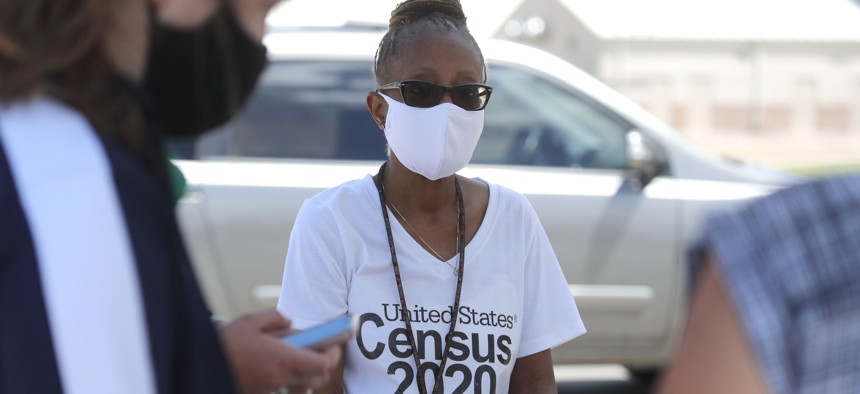Census Bureau Says It Will Stop the Count A Month Early

Amid concerns of the spread of COVID-19, census worker Jennifer Pope wears a mask and sits by ready to help at a U.S. Census walk-up counting site set up for Hunt County in Greenville, Texas, Friday, July 31, 2020. AP Photo/LM Otero

Connecting state and local government leaders
Because of complications caused by the pandemic this spring, the Census Bureau had planned to keep counting people until Oct. 31.
The Census Bureau will end its efforts to count the U.S. population a month early, at the end of September, even as more than a third of the nation has yet to respond to the decennial questionnaire.
The bureau released a statement late Monday indicating its door knocking efforts would cease and online self-response options would close on Sept. 30 to allow for data processing.
The original deadline for the 2020 census response was July 31, but it was extended in the spring to the end of October. This shift was necessary, officials said at the time, because of the complete shutdown of field operations due to the coronavirus pandemic.
The bureau said the deadline shift would not negatively affect its efforts to count the U.S. population, but experts caution that bumping up the deadline would lead to undercounting of minority populations.
“This kind of an effort to cut the effort short is completely unprecedented,” said Beth Lynk, the campaign director for Census Counts, an advocacy group that is part of the Leadership Conference Education Fund.
While about 63% of households have responded to the 2020 questionnaire nationwide, response rates in American Indian, Black, and Hispanic neighborhoods are lower, Lynk said. That means that if traditional door-knocking efforts that boost response rates in hard-to-count communities are cut short those neighborhoods will not be accurately counted.
The bureau has begun to deploy workers to do that door knocking, but they aren’t scheduled to be fully operational across the country until August 11.
In its statement, the Census Bureau said it would be conducting additional training for staff who go out in the field and provide awards for those who work the most hours in the remaining time frame.
“We will improve the speed of our count without sacrificing completeness,” the bureau said.
The 2020 Census will be crucial in determining how hundreds of billions of federal dollars are divided among states and localities in the years ahead for programs that help provide money for highway construction, food stamps and health care for the elderly and the poor. Census data provide the bedrock on which formulas are based for distributing certain federal funds.
An undercount of just 1% of the population could have dramatic implications for state coffers. About 300 federal programs rely on census data to make decisions about the allocation of more than $800 billion a year in funds.
Lawmakers in some states have been pushing for the Census Bureau to receive more money as part of the next coronavirus relief package.
In Connecticut, where the response rate stands at 66%, some urban areas have among the lowest response rates in the nation. Hartford’s response rate is 44.6%, while New Haven’s is 50.5%, according to the Connecticut Mirror.
Lt. Gov. Susan Bysiewicz said that “forcing the U.S. Census Bureau to rush the enumeration process will leave our most overlooked communities—particularly communities of color and immigrants—shortchanged for the next decade.”
The 2020 census has been plagued by challenges that could affect counting efforts.
The Trump administration initially sought to include a question about citizenship on the questionnaire. The U.S. Supreme Court last year rejected the administration’s reasoning for including the question and President Trump later abandoned the effort.
But immigrant advocacy groups and local leaders worry that distrust of the federal government among immigrant communities, which was heightened by discussions of the citizenship question, could still undermine efforts to get a complete count of people living in the United States.
The coronavirus pandemic also led the bureau to postpone field work for two months. Cities have partnered with community groups to get the word out about the census this year, but many of the in-person events that would normally help promote the message had to be canceled.
To ensure the Census Bureau has the time it needs to complete its count, Lynk said federal lawmakers could extend the deadline for the bureau to turn over the data it collects. That would allow enumerators to continue their work to ensure as many households complete the survey as possible, she said.
Andrea Noble is a staff correspondent with Route Fifty.

NEXT STORY: Lack of public data hampers COVID-19 fight




